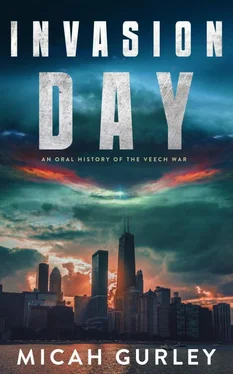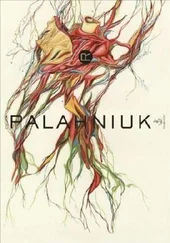I repeated this a few more times, all in my neighborhood, when I came to the most prominent house in a community of big homes. It was the house of a city councilman. I knew of the guy, but had never talked to him. His home was more mansion than house, with at least twenty rooms, but none of that bothered me. What set me off, what pulled at my anger, was what surrounded his house. There must have been ten police officers in front of his house. While my wife and little girls were tortured and raped a few streets over, this guy had sat comfortably in his mansion, surrounded by police who could have made a difference.
I would like to say I was mad with grief, that I didn’t know what I was doing, but I did. I remember every detail, every decision I made at that point. The man had to die. I walked around the back of the house and easily slid inside a window when nobody was watching. I walked that house casually, not worried about being discovered, not caring about anything except revenge. I found him alone in his study. He was in his mid-thirties and handsome. He saw me and started screaming. I walked up to him and cleaved him right through the head. The cleaver was stuck, so I just let it drop with him and slumped to the floor next to him.
The cops busted in and handcuffed me. I don’t remember what happened next, except that I was put into a cell where I stayed for the next year. I was lucky. There were police officers who remained on the job, despite the world falling apart. They kept me safe, gave me food, and turned me over when they could. They didn’t need to do any of that. They could have easily killed me and been done with the whole situation.
He stands up, walks to a tree, and picks two apples from it. He offers one to me. We both eat the apples quietly.
I was placed here as soon as they built the place. I think it was the second year of the war, but I’m not sure. I’ve been told the public wasn’t interested in taking care of prisoners, but the president at the time didn’t want to see massive executions carried out. He ordered this prison built in this dead city and told us good luck. I imagine it appeased his conscience. Not that I blame him, you understand. The people who were placed here are all murderers, and some are much, much worse. There are many like me, who… well, weren’t criminals by vocation, just ended up in a bad situation.
There were initially over 100,000 people placed in these fifty square blocks of death. It soon became a place of nightmares. I often wonder if the president put us here to kill each other? If so, it worked well and was an elegant solution.
The fighting here eventually came from two different groups. One group didn’t enjoy killing, and yes, I know the irony in that, and the other group desired chaos. I was part of the first group, obviously. The fight between the two groups lasted for two years. Two years of brutal savagery that would rival the stories of Genghis Khan. We eventually won and killed the other group to the last man and woman.
He sits quietly again, arms resting on the picnic table, his hand rubbing at a scar that runs down his cheek.
Afterward, we set up a small leadership, nothing grandiose, just a starting point, so that we could survive. We buried the dead, cleaned up, found housing and food left from before the invasion, and got down the business of living.
Eventually, we traded with the outside for jackhammers and seeds, found shovels and rakes, and started tearing down old Detroit and building up what you see before you. We can’t do anything with the skyscrapers, but we can tear down small buildings and homes that are too far gone. We’ve created an agricultural society mostly, but it works. We have little crime here, and for the most part, it’s a good place to live. None of us have any illusion of getting out, so we enjoy life the best we can.
We are broken people. We have all committed… sin (Gives a small smile.),but that doesn’t mean there is no redemption.
Phoenix Station
Fixed Geo Orbit
At the age of 87, Anna Lim is known as the “Mother” of the Phoenix Station. She is a universal hero to those who know their history of Terran Space Command. She was instrumental in the building and organizing of the Phoenix Station. The space station is the largest one in human space and is the headquarters of Terran Space Command. Though retired, she agreed to speak with me while visiting Phoenix Station.
I’m what you Americans call a town manager, or rather I was, for the country of Singapore. I was in this position until I retired the first time. The Veech attacked when I was visiting my daughter and her husband in Spain. I’m one of the lucky ones. Only a few Singaporeans are left now, so when I was approached by President Valez, the chairman of the board at that time, I accepted eagerly.
It is important to note that the board of the TSC appointed me. I was not involved in the forming of the TSC in any way. Saying that, I believe the rise of the Phoenix Station was the rise of TSC.
However, before I accepted, the TSC recognized that humanity didn’t have the technology or know-how to build a space station. In addition to that, we had lost some of our greatest minds in the attack. This led to the “Great Academic Influx” (Makes quote signs with her hands.).I don’t know how the TSC Board did it, but they, with the help of the Jhi, brought in builders, architects, designers, and teachers. Humans became menial labor in building our space station.
One condition that every alien had to agree to was the requirement to teach as they worked. The most extensive internship program in human history began with thousands of Ph.D.’s carrying tool bags for alien workers. (Smiles.)No one cared. It was the chance of a lifetime. It didn’t bring human technology or understanding up to speed with the rest of the universe, of course, but it gave us a solid foundation that we have continued to expand on.
My role truly started once living accommodations were completed, and a large portion of the labor moved into the station. As the station’s size, scope, and complexity grew, the problems multiplied many times over.
What sort of problems?
Our human crew, primarily. The many problems I had with the human crew crystalized President Valez’s issues over culture. To begin with, each contingent of humans wanted to work with each other, not with people from other countries. We tried to integrate as much as we could, but it had diminishing returns. Then, each contingent of workers had programs they lobbied to work on, those skills they saw as the most valuable. This created more conflict.
In addition, there were different problems that were distinct to different cultures. For example, those workers from the West, mostly Europe and North America, complained or sometimes outright refused their orders. If a last-minute switch happened with a job, they complained. If they had a double shift or a change of shift, they complained. They were a headache. I never heard a word of complaint from most of the Asian workers. They were given their job, and they did it. They, however, were too rigid in their obedience to authority—the polar opposite of North Americans. One time a group of Koreans were welding in our first docking bay and had received the wrong instructions from their supervisor about where to weld their rods. They put two hundred man-hours in the project when an American screamed at them to stop what they were doing. The American pointed out the obvious mistake, but the Koreans refused to stop, saying they had received their instructions, which was the end of it. The American grabbed the orders and said, “Damn your orders, you’re building a jungle gym in my bay.”
Читать дальше












